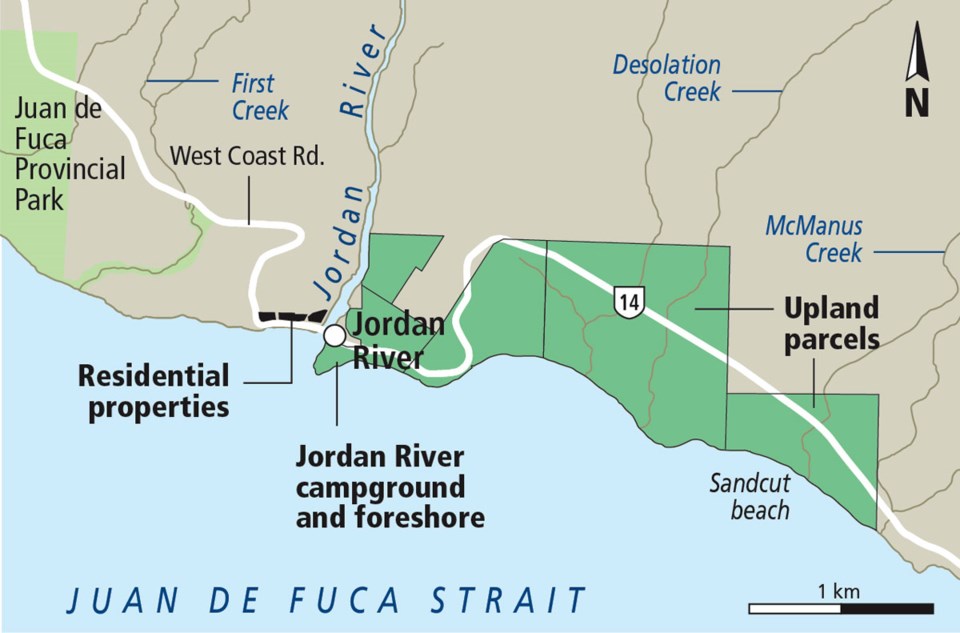The Pacheedaht First Nation wants its traditional lands at Jordan River returned and has an eco-tourism vision for the area.
Elected Chief Jeff Jones and other members of the nation presented their ideas to the Capital Regional District board this week.
Their plan includes possible surf shops, traditional Nuu-chah-nulth canoe rentals, an interpretive centre and restaurants featuring a Pacheedaht salmon bake.
Jordan River is the origin site of the Pacheedaht First Nation, Jones said, and archeological digs have identified two historic villages near the river’s mouth.
“We would love to have the opportunity of getting Diitiida, which is Jordan River lands, back. This is a very important place,” he said.
Achieving the nation’s vision will depend on land transfers from both the CRD and B.C. Hydro, which each own part of the land in question.
Jones said Wednesday’s presentation is the first step in opening dialogue with the CRD, while the nation is already in talks with B.C. Hydro.
The future of Jordan River has been up for debate since B.C. Hydro announced a major earthquake would destroy its dam and wipe out the homes below. It has purchased all but one home along the main strip.
Last year, B.C. Hydro also purchased 15 hectares of land in the flood zone, including the old town site, from the CRD for $3.13 million. The CRD still owns the land south of West Coast Road as part of the remaining 165 hectares it purchased for parkland in 2010.
Kristine Pearson, one of the Pacheedaht presenters, said the nation’s ideas for the flood zone include an outdoor Saturday market, kayak and traditional Nuu-chah-nulth canoe tours and equipment rentals, expanded camping opportunities and a transportation hub for shuttles to the Juan de Fuca Trail and West Coast Trail.
No overnight accommodations are permitted in the flood zone, but the existing residential area could host more businesses such as the existing Cold Shoulder Cafe, which could include traditional salmon bakes, as well as wetsuit and board rentals and other leasing opportunities, Pearson said.
The Pacheedaht could discuss a management plan for the camping area with the CRD. The campground and foreshore would also be an appropriate site for an interpretive centre.
“There are recent archeological artifacts found at the point there, so that particular spot is of high significance for the Pacheedaht,” Pearson said.
Public waterfront access would also be preserved in the foreshore area near the Queesto office.
Two upland parcels zoned for logging would be used for forestry operations in the short term. In the long term, they could host Pacheedaht housing and accommodations.
Mike Hicks, the CRD’s electoral area director for Juan de Fuca, said that while few details are available publicly, he personally supports the Pacheedaht proposal.
In 2012, the CRD purchased the land from Jordan River to Sandcut Beach, in the interest of protecting it for public use. Hicks said the Pacheedaht vision fits that use.
He said the transfer of lands from B.C. Hydro to the First Nation would also be positive for the region’s revitalization. “I don’t have any faith that B.C. Hydro would aggressively be trying to find little businesses and surf shops to open in Jordan River.
“But I think the Pacheedaht, if they owned it, would be highly motivated to have a little community working there,” he said.
“I think the other locals would welcome it.”
He said the Pacheedaht already play a positive role in the Port Renfrew community, where it is involved in the hotel, marina and a campground.
The Pacheedaht First Nation is also working on an agreement-in-principle, in its treaty negotiations with the provincial and federal governments. Jones said he expects to reach an agreement-in-principle in the next few months.



